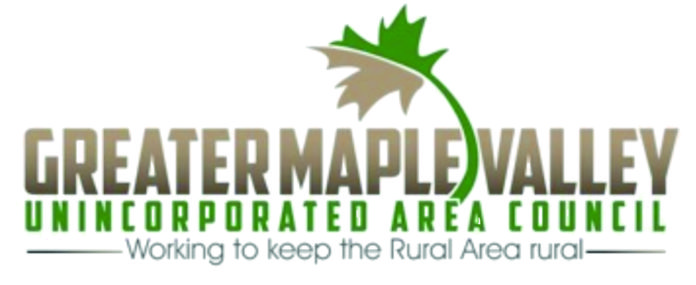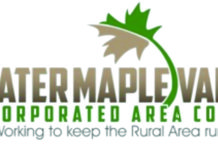On Monday, November 7, the Area Council held its regular monthly meeting at the King County Sheriff’s Precinct #3 at 22300 SE 231st St in Maple Valley and online via Zoom. Guest Speaker was Dwight Dively, King County Budget Director. Other topics discussed were: Area Council By-Laws and Area Council’s Annual Train Show.
King County Biennial Budget
Dwight Dively, Director of the King County Office of Performance, Strategy and Budget, provided an overview of the budget process and details for the 2023-2024 budget. King County provides local and regional services to 2.3M residents. King County government is unique in that it is both a regional government—providing services throughout most or all of the county, and a local government—providing services in the unincorporated area (outside of cities).
Regional services include public health, transit, wastewater treatment, housing, behavioral health, elections, property assessment, solid waste transfer and disposal, corrections, regional parks and trails, and the prosecution, defense, and adjudication of felonies. Local services include roads, police protection through the Sheriff’s Office, land use regulation and permitting, and surface water management. Many other governments contract with King County to provide certain services, including police protection, courts, jails, public defense, and additional transit service.
The 2023-2024 Proposed Budget totals $15.8B, a 28% increase from the 2021-2022 Adopted Budget, which reflected reductions in many funds due to the recession caused by the COVID-19 pandemic. This 28% increase is somewhat misleading as rapid economic recovery and influx of large amounts of federal funding allowed many reductions to be reversed midway through the biennium.
The largest sources of Revenue are: Charges for services (28%) which include solid waste and tipping fees, wastewater treatment charges, and Metro Transit fares; and Capital revenue (17%). The largest categories of Appropriations by agency are: Metro Transit (20%); Wastewater Treatment (15%); and the Department of Community and Human Services (14%).
King County’s General Fund is its only truly flexible money that can be used for any lawful purpose. General Fund revenues and expenditures are those associated with traditional county services. The General Fund is projected to receive $1.89B in revenue (~12% of the total budget). The largest sources of Revenue are: Property taxes (37%); Charges for services (29%) which include payments from other governments that purchase services (e.g., some Police, some Courts, etc.)from the County; and Sales taxes (17%). The largest categories of Appropriations by agency are: Sheriff’s Office (21%); General government (16%); and Adult and Juvenile detention (16%).
The revenue system used in Washington is heavily dependent on volatile sales and excise taxes means, does not keep up with economic growth, and is highly regressive. The revenue system for counties is even worse. The State determines which revenue sources are available to counties and has limited those to property and sales taxes. In contrast, the State itself and cities are allowed to impose property taxes, sales taxes, utility taxes, and a wide array of business taxes.
The only reason that counties have managed to maintain most service levels since the passage of the 1% limit on annual property tax revenue growth is that inflation was low for the ensuing two decades. This reduced the need for wage increases and held down the costs of supplies, fuel, and construction. King County typically balanced its budget through efficiencies, modest service reductions, and small new revenues such as the franchise fee. However, the recent increase in inflation ended the ability to cope in this way and it is now impossible to maintain services when costs are growing at these rates and property tax revenue is only allowed to increase by 1% annually.
The 2023-2024 General Fund Proposed Budget was balanced using one-time money from salary savings and federal COVID response. These will be exhausted at the end of 2024, leaving a 2025-2026 General Fund deficit projected to be $80-100M depending on the fund balance desired at the end of the biennium—equivalent to ~300-350 General Fund employees. Some County functions, such as corrections, elections, and public defense, are required by State law and thus cannot be meaningfully reduced. Thus, staffing cuts will fall disproportionately on the courts, prosecutors, administrative agencies, and internal service agencies that support all County departments.
The County’s financial policies require the General Fund’s undesignated fund balance to be between 6% and 8% of total revenue (excluding some contracted revenue). The undesignated portion of the fund balance is projected to be $61.9M at the end of 2022 (again due to salary savings and federal funds) but decline to $61.2M at the end of 2024. This reflects the planned reduction in the targeted unreserved fund balance from 8% of revenues to 7%. King County came out of the Great Recession with a 6% undesignated fund balance and gradually rebuilt to the 8% level. The current projection of 2026 ending fund balance is only $66.5M, with a negative undesignated fund balance, which violates County financial policies.
State requirements restrict flexibility in most parts of the budget. The inadequacy of revenue options available to counties will necessitate large budget reductions in the future unless additional revenue flexibility is obtained. For more information, please see: https://kingcounty.gov/depts/executive/performance-strategy-budget/budget/2023-2024/2023-2024-Budget-Book.aspx.
Area Council By-Laws
The Area Council maintains a set of By-Laws—a set of rules to: (1) Serve as an internal organizing document and (2) Regulate both internal and external activities. From time to time the Area Council amends its By-Laws.
The Area Council discussed and adopted several amendments including recognition and authorization of: (1) Joint Planning through a Regional Coordinator to work with other King County Rural Area organizations (including Unincorporated Area Councils and Associations) and (2) A set of Guiding Principles through which Joint Planning is governed:
•CAPITAL FACILITIES—Do not locate regional capital facilities outside the urban growth area unless it is demonstrated that a non-urban site is the most appropriate location for such a facility. Do not provide urban services in rural areas. Design services for limited access when they are needed to solve isolated health & sanitation problems, so as not to increase development potential of the surrounding rural area. Provide a realistic plan to close the Cedar Hills Regional Landfill.
•CODE ENFORCEMENT—Prioritize Code Enforcement; Enforce Haul-Route Agreements.
•INDUSTRIAL FACILITIES—Do not allow Industrial-scale operations including: Materials Processing Facilities (requires change to KC Code 21A.08.080 — Manufacturing); Composting Facilities; and Winery/Brewery/Distillery retail tasting facilities.
•PERMITTING—Tighten “vesting” rules for when a permit application is found to be complete.” Do not allow Upzones.
•PLANNING—Ensure consistency of plans among adjacent jurisdictions (e.g., city and county) as required by the State’s Growth Management Act to ensure consistency for connecting routes.
•CONCURRENCY—Develop, implement, and evaluate concurrency programs and methods that fully consider growth targets, service needs, and level-of-service standards. Work to coordinate rate of future growth in small suburban cities to be concurrent with the provision of adequate capacity on state highways to serve the city-to-city traffic flows. Institute fees for Urban pass-through traffic on County roads.
•TRANSPORTATION—Replace all existing impact mitigation and concurrency management standards and regulations with a new system based on vehicle-miles-of-travel as a common basis for measurement of development impacts, mitigation, and multi-modal system capacity.
The adopted revision to the By-Laws can be found at: http://gmvuac.org/bylaws-committee/.
Area Council’s 24th Annual Train Show
On the weekend of October 15 and 16 the Area Council held its Annual Model Train Show at the Gracie Hansen Mansion in Ravensdale. There were over 700 attendees from as far away as Mount Vernon. We had 12 train clubs and the Tahoma High School Robotics Team bring their displays to share. It was fun watching the delighted faces of the children (and adults) as they entered and saw the train exhibits, robotics, and play area. A food truck included Pizza Maniac and Kendra’s Cakes. A silent auction was again popular. The Black Diamond Historical Society display depicted the times of coal mining and local areas of development. In 2023, we will encourage other Unincorporated Area Councils / Associations to participate to help promote their involvement in our local community.
Next Area Council Meeting
The next Area Council monthly meeting will be held Monday, December 5 from 7 – 9:30 PM at the King County Sheriff’s Precinct #3 at 22300 SE 231st St in Maple Valley. As a hybrid meeting, people will be able to attend either in-person or virtually via Zoom. Our Guest Speakers will be the King County Department of Local Services (DLS) Director, John Taylor, and DLS External Relations Manager, David Daw. DLS serves all of King County’s the Unincorporated Areas including the Rural Area that makes up the Area Council’s territory.
All regular monthly meetings are held on the first Monday of the month (except for Holidays, when they are held on the second Monday), from 7 – 9:30 PM. Meeting announcements, Agendas, and Zoom information are published in the Voice of the Valley, the Area Council’s website (www.gmvuac.org) and local NextDoor platforms. You can also find us on our FaceBook page: https://www.facebook.com/GMVUAC/. Each meeting begins with an open Public Comment period where anyone can voice concerns, comments, etc. to the Area Council.
Area Council Membership
Your Area Council serves as an all-volunteer, locally recognized advisory body to King County on behalf of all rural unincorporated area residents living in the Tahoma School District. The Area Council’s Vision Statement is:
“Our community’s Rural Character will be supported by facilitating strong local ties and communication between the public, organizations, and government; promoting locally owned businesses and supporting quality education; protecting the environment, and maintaining landowners’ rights and responsibilities; promoting controlled and well-planned growth with appropriate infrastructure; ensuring proper representation for rural interests and needs; and supporting the health and safety and the privacy of our vibrant community.”
The Area Council also work regionally throughout the county with other Rural Area organizations through both Joint Planning and its Joint Transportation Initiative.
The twelve-seat Area Council has four open seats. If you have an interest in joining, please send an e-mail to: info@gmvuac.org or attend (either in-person or virtually) a monthly meeting and express your interest. To be eligible to join the Area Council as a member you need to live within the Tahoma School District. Anyone, even those who do not live within the Tahoma School District, are eligible to become Associate Members who can serve on any Area Council Committee: Environment, Growth Management, Transportation, Public Relations, or Train Show. Each committee votes for its own Chair and Vice-Chairs and Associate Members are eligible for those positions.
The Area Council welcomes your participation. For information on each of these committees please see the Area Council’s web site: www.gmvuac.org and use the drop-down menu under Committees. Again, if you have an interest in joining any Area Council committees, please send an e-mail to: info@gmvuac.org. Thank you.



